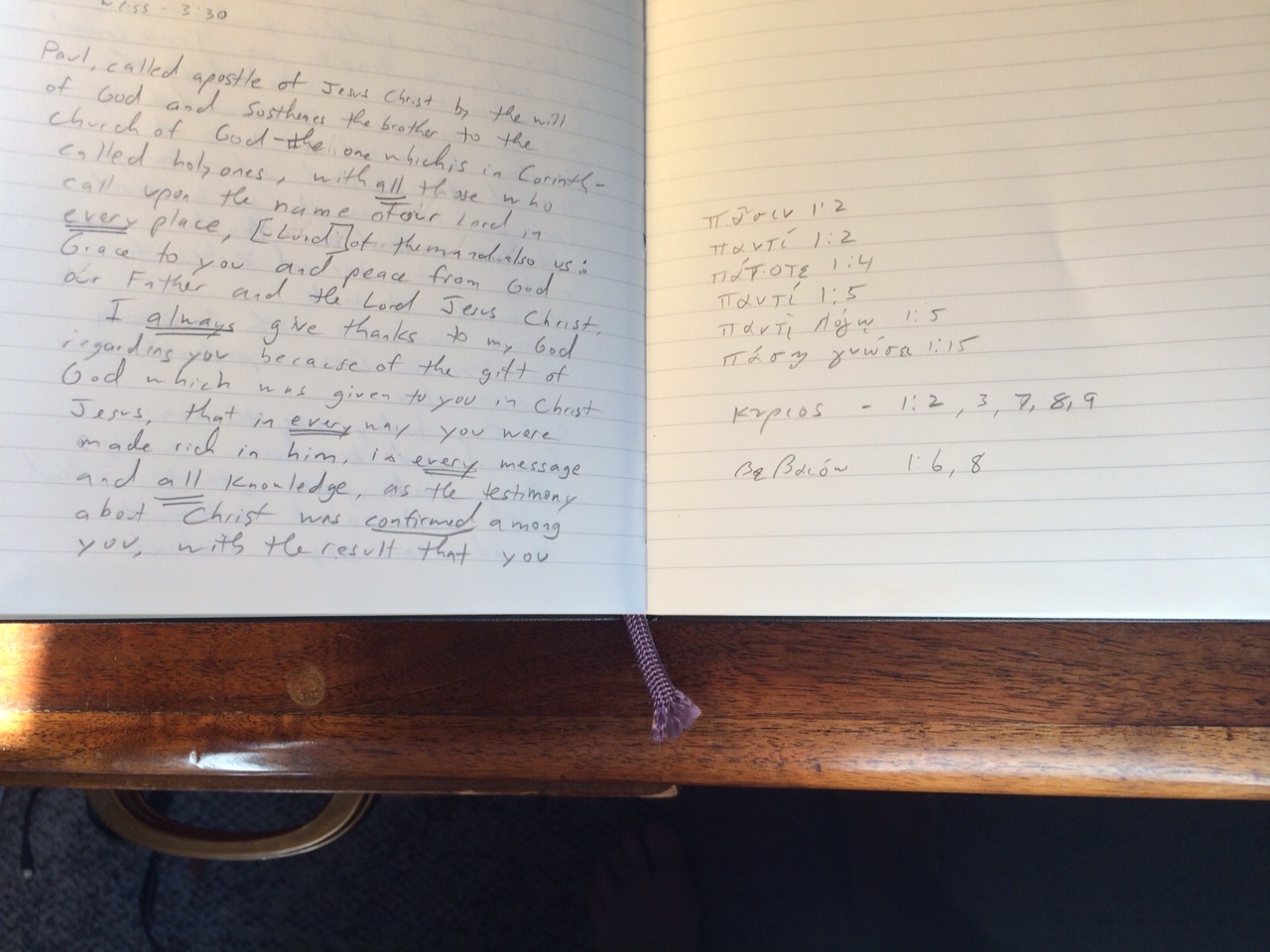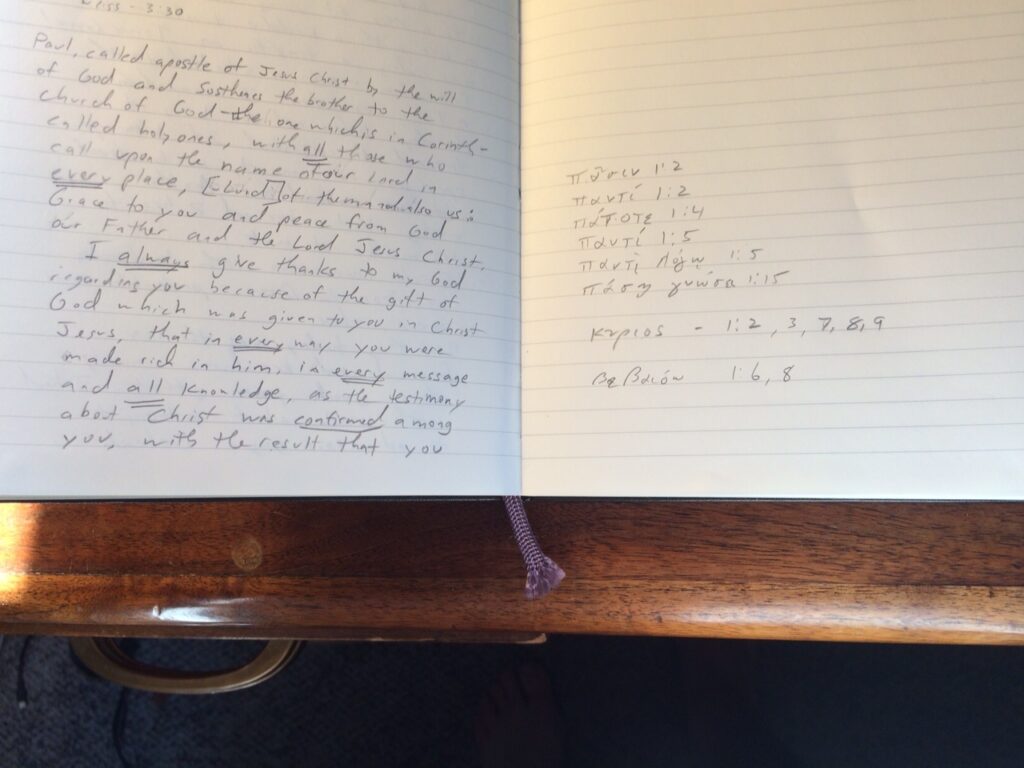“Paul, called apostle of Jesus Christ by the will of God, and Sosthenes the brother [writes] to the church of God—the one which is in Corinth—called holy ones, with all those who call upon the name of our Lord in every place, [Lord] of them and also of us: Grace to you and peace from God our Father and the Lord, Jesus Christ.”
“I always give thanks to my God regarding you because of the gift of God which was given to you in Christ Jesus, that in every way you were made rich in him—in every message and in all knowledge—as the testimony about Christ was confirmed among you, with the result that you are not lacking in any gift while you are awaiting the revealing of our Lord, Jesus Christ. He will confirm you blameless until the end, on the day of our Lord, Jesus Christ. God is faithful, through whom you were called into participation together with his Son, Jesus Christ, our Lord.” (1 Corinthians 1:1-9)
I try to make a regular habit of translating a portion of Greek—it doesn’t happen every day. But the act of sitting with nothing but the text, paper, pencil, and eraser disciplines me to slow down, and forces me to deal with each word of the text, have it make sense (at least to me), and ultimately to take it seriously. To allow the text to engage me on its own terms.
When you work with the New Testament in this way, you start to notice things. Because you are moving slowly, deliberately. Kind of like walking the trail through the woods rather than riding a mountain bike on the same trail – both get you to the same place over the same route. But on the mountain bike you’re focused on the trail, the rocks and roots that threaten to throw you off the bike, and you’re trying to go as fast as you possibly can (at least that’s what I do). Walking the same trail is a very different experience. You notice the oddly shaped fungi on the north sides of the trees. You catch a glimpse of a chipmunk darting away in the underbrush. You reflect on the dappling of light on a rock as it filters through the leaf canopy. Riding a mountain bike and walking the path are both fun. But one is done on my terms—I am the one pushing ahead. The other, the slow walk, is done on the forest’s terms. It draws me in, displays itself to me, for me to see, smell, feel, and enjoy.
So slow-pencil-paper-eraser-working with the Greek forces me to receive the text, to struggle with the text, to notice things that I otherwise would not see because I have my own things that I want to get to. Instead of hopping on my bike early this morning, I thought I’d write up and post my reflections. It also happens that I write these words just as the Seminary’s annual Summer Greek class of new students is finishing their work today—pics of fountain jumps will no doubt follow on Facebook.
I’m starting again on 1 Corinthians because I have a couple of district pastors conferences this fall. Even though I’ve read 1 Corinthians at least a few dozen times (this is what dissertations force you to do), there are always new things that present themselves. Maybe not earth-shaking, certainly not some kind of new meaning or interpretation. But every new reading of the text makes us better at reading it the next time, and we notice things that we didn’t see before. Maybe, like a walk through the forest, because it is a different time of day or different season of the year.
Three specific words jumped out this morning: πᾶς (all), κύριος (Lord), and βεβαιόω (confirm). πᾶς (or a compound) occurs six times in these nine verses: “all those who call upon the name of our Lord,” “in every place,” “I always give thanks,” “in every way you were made rich,” “every message,” and “all knowledge.” In English, of course, you have the render the Greek vocable differently in each case (simply due to English usage). In Greek the bilabial fricative /p/-sound literally pops off the page: pasin, panti, pantote, panti, panti, pase, pantes. Is this just an accident? I don’t think so. The focus of this opening of the letter to the church in Corinth focuses on the universality of the reign of Christ in his church. Corinth is not its own little independent operation, but it has received all things in Christ and it is part of the church throughout the earth which is made up of all those who are in Christ.
The church is universal because the message is universal because the One who reigns is Lord of the universe. And so another repeated word in this passage is κύριος (Lord)—five times the word occurs. And both the opening paragraph (1:1-3) and the second paragraph (1:4-9) conclude with κύριος: Paul can confidently bestow grace and peace because its source is God the Father and our Lord, Jesus Christ (1:3). And our salvation is firm until the Last Day because of one person, the Lord, Jesus Christ (1:9). Those are, in fact, the last words of the paragraph in Greek: τοῦ κυρίου ἡμῶν / “our Lord.” Christ gets the last word (literally the last word), because he is the one who reigns over all things. He has power over all (jump ahead to 1 Cor 3 and 4 and then 15 if you want to see how Paul develops this later) and so is able to “confirm” us as “faithful” until that great last day (1:8).
Which brings us to the third word that stuck out this morning: “confirm” / βεβαιόω. Notice that throughout this entire section the Corinthians (and likewise we also) do nothing: God calls, he gives grace and peace, he gives gifts, he reveals, he makes rich, he confirms, and he (again) calls. What is the takeaway for Corinth? Faith, life, and everything that they have come from God in Christ Jesus—well, at this point we might as well quote 3:21-22: “For all things are yours, whether Paul or Apollos or Cephas or the world or life or death or the present or the future—all are yours.” They (we) have it all. They (we) lack no thing (μηδενὶ 1:7). Nothing. Everything came as gift, and those gifts continue to be poured out again and again and again until the Last Day, when God will finally “confirm” us as faithful, holy, righteous, and any other adjective that describes one who has been bought by Christ (6:20).
Corinth’s problem, as you know, was puffiness; they were so “free” by the Gospel that they thought they could do whatever they wanted. They were so puffed up by their so-called knowledge that they could justify any behavior: “All thing are permissible for me!” But right at the start Paul reminds them that all that they have is gift—from beginning to end all things come from God through Christ. The foolishness of the cross (1:18-24) is not as useless as they might think.
And, that is where we are. We have all things in Christ. We have a Lord who has called us, and who reigns over all—even when the evidence of the 24-hour news cycle, Facebook, and blogs seems to indicate that he is not. And we remain “blameless” not because of our efforts or cunning or apologetics or maneuvering. Even our best efforts are fleeting and temporary. He daily and richly provides us with all that we need; he has called, gathered, enlightened, and sanctified (“made holy” 1:2) even us. Everything is gift. And we remain “blameless” solely because “God is faithful.”



Leave a Reply
You must be logged in to post a comment.